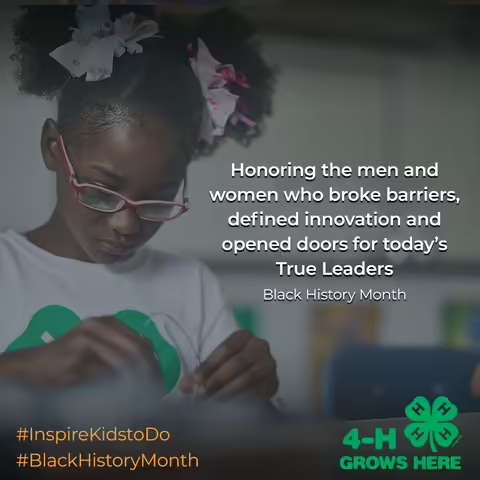DECATUR, Ill. — Black History Month is an opportunity for parents to introduce children to age- appropriate discussions about race and culture beyond the classroom.
“As educators, mentors, friends, family and community members, we set the tone for how youth view themselves, their culture and the world,” said Macon County 4-H Educator Trinity Johnson. “We have the awesome task to energize and educate students by creating a triumphant narrative.”
This February make it a point to discuss African American trailblazers and culture around the dinner table. Take trips to a museum to see Black History month exhibits. Check out a relevant book from the library, watch documentaries and do research together online.
Another easy way to discuss Black history with children is by introducing them to role models across a variety of fields. This instills African American students with a sense of empowerment and pride.
“Provide an opportunity for students to delve deeper into the countless impacts made by African Americans in education, technology, history, art, music and civic engagement,” Johnson said.
Tailor conversations to topics children are already interested in. Do they love to dance? Introduce them to ballerina Misty Copeland. Are they into sports? Talk about Jackie Robinson and other athletic pioneers.
Context is important in these discussions. “Students must be taught that Black History did not begin or end with slavery,” Johnson said.
Black History Month is an opportunity to celebrate the endeavors and contributions of Black people throughout history, but also the challenges and struggles they had to overcome in the past and today. It is part of American history and history isn’t always pretty.
It is important for parents of all ethnic backgrounds to educate themselves and feel comfortable enough to bring up topics such as slavery, oppression and racism. They should also be prepared to answer hard questions with simple, concrete explanations. There is no shame in saying “I don’t know, but I’ll find out” and returning to the conversation after more research.
While it is important to discuss difficult issues, struggle shouldn’t be the only narrative. “Black history is not a tragedy,” Johnson said. “It is a celebration and symbol of resiliency, hope and triumph.”
Share stories of joy and everyday life. Make it a point to watch or read contemporary media with diverse representation. Speak with older generations about local Black history.
“African American history and culture is about encouraging, inspiring and motivating all individuals that no matter the adversity you face, you have the responsibility to aspire for excellence,” Johnson said.
The 4-H program is provided through University of Illinois Extension and is open to youth ages 8 to 18. Youth learn skills for living by participating in individual or group learning experiences related to more than 200 project areas. If you're interested in learning more about 4-H, fill out this survey to find out about 4-H in your area.
30-Second PSA: This Black History Month, Illinois 4-H is encouraging parents, teachers and mentors to have age-appropriate discussions with kids about race and culture. 4-H Educator Trinity Johnson encourages families to talk about African American trailblazers around the dinner table, check out library books and do research together online. Introduce children to Black role models. Answer questions about oppression and racism with simple, concrete explanations. If you don’t know the answer, it’s OK to say so and find out more.
Source: Trinity Johnson, Macon County 4-H Youth Development Educator, (217) 877-6042 or trinityj@illinois.edu. Program interests include STEM, agriculture, creative arts and community service.
News Writer: Emily Steele, Publicity Promotion Associate
Contact
Trinity Johnson
Extension Educator, 4-H Youth Development
Macon Extension Office
3351 N. President Howard Brown Blvd., Decatur, IL 62521
(217) 877-6042
trinityj@illinois.edu
